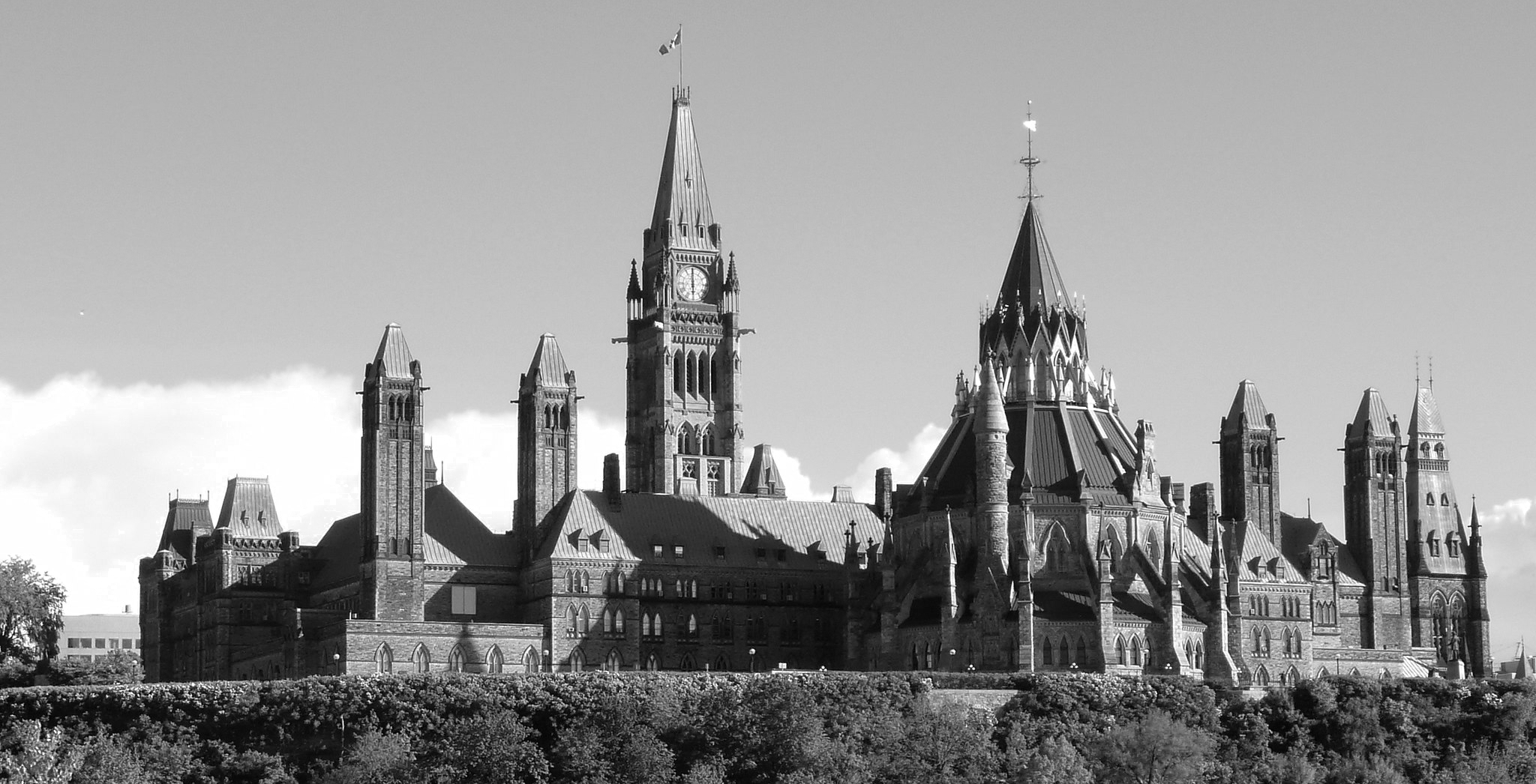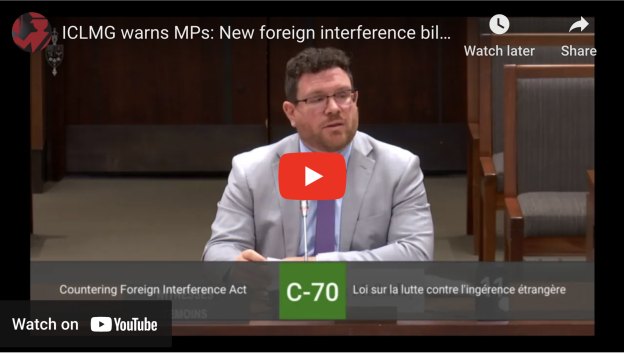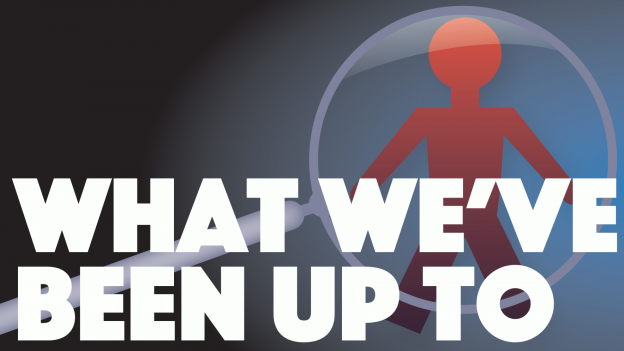
Credit: Tom Bastin/Flickr CC BY 2.0
Here is what we’ve accomplished so far in 2024 thanks to your support:
Bill C-20, Public Complaints and Review Commission Act
Bill C-20 would create a new, independent review agency for both the RCMP and CBSA.The creation of an independent review body for the CBSA has been a longstanding demand of the ICLMG. We have:
- Met with colleagues to update proposed amendments following the House of Commons committee study & sent a joint statement on recommendations to the Public Safety Minister
- Met with Senators Omidvar and Yussuff in January to discuss the upcoming Senate study
- Met with NDP Public Safety critics Peter Julian & Alistair MacGregor to further discuss the bill
- Raised the lack of independent review with the UN Working Group on Arbitrary Detention
Bill C-27, Digital Charter Implementation Act, 2022
Bill C-27 is the government’s long-promised update to Canada’s private sector privacy law and would enact a new Artificial Intelligence and Data Act (AIDA), which raises major concerns given the growing use of AI in surveillance capitalism and government surveillance. ICLMG:
- Co-wrote an open letter signed by 60 prominent groups and experts in April 2024 calling for the withdrawal of AIDA from C-27
- Updated and promoted our letter-writing campaign calling for protection against facial recognition tech and surveillance
- Updated and promoted our letter-writing campaign calling for the removal of the national security exemptions from C-27
C-41: International assistance and anti-terrorism laws
Humanitarian aid and international assistance generally is being hindered by Canada’s anti-terrorism laws, particularly in Afghanistan – a risk ICLMG has long warned about. The government passed Bill C-41 in June 2023 to ostensibly address the issue. Thanks to our advocacy alongside several other groups, we were able to secure an exemption for humanitarian activities. However, C-41 aimed to create a cumbersome and invasive authorization regime for development and assistance activities that aren’t “humanitarian” in nature. A clear definition of what a humanitarian activity is has not been provided and the authorization regime has not been put in place to date. On this topic, ICLMG has:
- Participated in a Public Safety Canada briefing on the implementation of the provisions of Bill C-41 and raised concerns around the proposed authorization process
- Raised concerns about the delays in the implementation of C-41 with NDP Public Safety critic Alistair MacGregor
Bill C-63: New Online Harms Act
The federal government introduced Bill C-63 in February 2024. It responds to many of our concerns with the government’s original “online harms” proposal from 2021, but several aspects of the bill – old and new – continue to raise serious concerns. On this topic, ICLMG has:
- Read, analyzed and started to draft a brief on the bill
- Met with a policy advisor to Justice Minister Virani about the bill in April
- Signed onto a letter in May urging the Justice Minister to split Bill C-63
Bill C-70: New Foreign Interference legislation
Although the federal inquiry into foreign interference continues its work, in May 2024 the government introduced new foreign interference legislation, Bill C-70. Much of it reflects proposals from a consultation held from December to February, but fails to respond to many of the concerns that we raised with the government. And now the bill is being rushed through committee, which will not allow for a proper study. On this topic, we have:
- Participated in an online roundtable for the foreign interference consultation
- Sent submissions in February to Public Safety & Justice Canada for their respective consultations on legislative responses to foreign interference (which are now in C-70)
- Issued a press release with our preliminary reaction to the new foreign interference bill, which received coverage in several media outlets
- Thoroughly analyzed the bill & met with other Canadian & int’l groups to discuss concerns
- Continued to stay appraised of the commission and how we can offer our expertise of the impact on civil liberties, which is severely lacking from the terms of reference
Parliamentary study on Transparency of the Department of National Defence
ICLMG was invited to appear at the House of Commons committee on National Defence’s study on “Transparency of the Department of National Defence and Canadian Armed Forces.” National Coordinator Tim McSorley spoke to:
- The Communications Security Establishment’s problematic history of secrecy and evasion of accountability
- The history of secrecy at the Department of National Defence, including in regards to the Afghan Detainee scandal and current concerns regarding defence intelligence activities

Office of the Privacy Commissioner of Canada
ICLMG continues to engage with the Office of the Privacy Commissioner as part of our work on oversight and accountability. So far, in 2024:
- We participated in the OPC’s quarterly civil society roundtable to discuss current privacy issues, including biometrics and Bill C-27
- We participated in the OPC’s consultation on guidance on the application of PIPEDA and the Privacy Act regarding biometrics. We shared our questions, concerns and recommendations with the OPC during an online meeting and in written responses to their online questionnaire
- We read and reacted to the OPC report on the RCMP’s “open source” internet surveillance under Project Wide Awake.
Palestine and the right to dissent
The Israeli government, and its supporters, have attempted to justify their ongoing genocide against Gazans as “fighting terrorism,” a view echoed by Canadian officials. ICLMG has continued to monitor the situation and take action:
- We shared news, analysis, and joint letters calling for a ceasefire, an arms embargo and for Palestinian refugees to be let into Canada
- We published a new statement and updated our original action calling on Canada to Oppose Genocide in Gaza and Defend Free Expression at Home
- We published a new statement and accompanying action in May denouncing the conflation of criticism of Israel with terrorism and the accompanying calls and police actions to repress dissent, most recently against campus encampments
- We participated in meetings of a new network of groups working to address attacks on civil liberties in the context of support for Palestinian human rights
Combatting Racism & Islamophobia
The ICLMG continues to oppose racial, religious and other forms of profiling and targeting by national security activities and laws, particularly that of Muslim and Arab communities and people of color. We are also aware of, and attempt to combat, the instrumentalization of acts of xenophobia, Islamophobia and racism to justify new or expanded use of national security laws. To that effect, we have:
- Highlighted the 7th “anniversary” of the Quebec Mosque shooting, which is also the National Day for Action Against Islamophobia, by remembering the victims and their families, and renewing our commitment to fighting Islamophobia, including anti-Palestinian racism
- Met with Amira Elghawaby, the federal Special Representative on Combatting Islamophobia, to discuss the rise of Islamophobia and anti-Palestinian racism in Canada
- Participated in a roundtable briefing on the new foreign interference legislation organized by the Office of the Special Representative on Combatting Islamophobia

Hassan Diab & Extradition
In April 2023, France proceeded with the trial of Dr. Hassan Diab, and in a miscarriage of justice, convicted him in absentia for the 1980 Rue Copernic bombing. We continue to advocate for Dr. Diab’s rights to be protected and for reforms to the Extradition Act, including by:
- Sending a call to action to email Mélanie Joly on the eve of her diplomatic trip to France to urge her to advocate for justice for Dr. Diab
- Updating and sharing our letter-writing campaign one year after the unjust verdict
- Sharing the new Parliamentary petition for Dr. Diab
- Signing onto an open letter urging the Justice Minister to commit to rejecting any second extradition request from France
Canadians detained in Northeastern Syria
At least 17 Canadians, including 7 children, and three non-Canadian mothers remain indefinitely detained in camps and prisons in northeast Syria. In November, the Supreme Court of Canada declined to hear the appeal of four men challenging Canada’s inaction in bringing them home. We have:
- Updated and promoted our letter-writing campaign in favour of repatriation of all
- Supported and publicized the request that the Supreme Court reconsiders hearing the appeal of the families of four Canadian men detained in NE Syria
- Raised the issue in a meeting with the UN Working Group on Arbitrary Detention
Mohamed Harkat & Security certificates
ICLMG has continued to work to eliminate security certificates, and defend the rights of those who are placed under one. We have:
- Sent a letter to the Public Safety Minister for him to allow Moe Harkat to stay in Canada
- Raised the ongoing issue of security certificates in a meeting with the UN Working Group on Arbitrary Detention

Canada’s Universal Periodic Review
We continue to engage in the process of Canada’s 4th Universal Periodic Review at the UN Human Rights Council. We have:
- Participated in an online meeting with a consultation process organized by Equitas intended to gather the views of civil society regarding the state recommendations received by Canada at the United Nations on Nov 10, to help Canada formulate its response
- We shared in writing which state recommendations Canada should prioritize, and which they should ignore. Our thoughts were heavily featured in Equitas’ final civil society report to the government of Canada
Civil Society Coalition on Human Rights and Counter-terrorism
The ICLMG continues to participate in the Civil Society Coalition on Human Rights and Counterterrorism. This has included:
- Participation in quarterly coalition meetings to exchange information and strategize around impact of international counter-terrorism mechanisms on human rights
- Participation in quarterly working group meetings regarding impact of UN counter-terrorism activities on civil liberties and human rights
UN Counter-terrorism Executive Directorate (CTED) Canada assessment
2023 marked the 2nd assessment of Canada’s implementation of UN counterterrorism resolutions by CTED. Since then we have continued efforts for the public release of their report on Canada. We have:
- Remained in contact with CTED regarding the status of the report
- Followed up with Global Affairs Canada on the status of the report and urging its release
UN Cybersecurity Treaty
In January, we signed onto a joint statement with more than 100 groups calling for crucial changes to UN Cybercrime Treaty or to vote against it all together
EU AI Convention
In February, we signed onto a joint letter with more than 115 groups and experts urging Canada to reject private sector carve-out in the Council of Europe AI Convention negotiations

ICLMG IN THE MEDIA
“Allow CSIS to share intelligence on security threats, business council asks Ottawa,” Jim Bronskill, The Canadian Press, 19 January 2024
“AI bill ‘democratically illegitimate’ and litigation ‘likely’ without proper consultations, say AFN, civil society orgs,” Stuart Benson, The Hill Times, 21 February 2024
“Border agency eyes smartphone facial recognition system amid privacy concerns,” The Canadian Press, 24 April 2024
“Feds advance ideas to fight foreign interference, prompting support and concern,” Jim Bronskill, The Canadian Press, 29 April 2024
“Trudeau fait confiance aux universités pour gérer les manifestations sur leurs campus,” François Joly, Le Téléjournal, 3 mai 2024
“Data privacy as a human right must be recognized by privacy and AI bill, say advocates,” Jesse Cnockaert, The Hill Times, 6 May 2024
“Foreign influence registry among proposed tools in bill to counter interference,” Jim Bronskill, The Canadian Press, 6 May 2024
“Liberal foreign interference bill includes some ‘good tools’ for RCMP: commissioner,” Jim Bronskill, The Canadian Press, 7 May 2024
“Priorité au registre et au respect des droits,” Marie Vastel, Le Devoir, 21 mai 2024
Check out all coverage of ICLMG in the media here.
We have also published many reactions and commentary on our social media accounts, which continue to reach tens of thousands.
We publish our News Digest every other week, which is distributed to thousands of people and has received numerous accolades.
+ Check out the News Digest archive if you’ve missed some of our issues.
+ If you know anyone interested in receiving it, send them an invite to sign up!
What we have planned for the rest of 2024!
Your support will allow us to continue our work on these issues and much more in the next year:
- Pressuring lawmakers and officials to protect our civil liberties from the negative impact of national security as well as opposing the discourse of “countering terrorism” to repress dissent, such as protests and encampments in support of Palestinian rights and lives.
- Opposing the weaponization of concerns around foreign interference to unnecessarily increase national security powers, which will greatly affect rights and liberties of Canadians, and will most likely lead to more harassment and xenophobia
- Ensuring that the Canadian government’s proposals on “online harms” do not violate fundamental freedoms, or exacerbate the silencing of racialized and marginalized voices
- Protecting our privacy from government surveillance, including facial recognition, and from attempts to weaken encryption, along with advocating for good privacy law reform
- Addressing the lack of regulation on the use of AI in national security, including proposed exemptions for national security agencies
- Greater accountability and transparency for the Canada Border Services Agency
- Greater accountability and transparency for the Canadian Security Intelligence Service
- Advocating for the repeal of the Canadian No Fly List, and for putting a stop to the use of the US No Fly List by air carriers in Canada
- Keeping you and our member organizations informed via the News Digest
- Publishing a collection of essays written by amazing partners on the work of the ICLMG for our 20th anniversary

We do not receive any funding from any federal, provincial or municipal governments or political parties so your support is essential to our work.
We are counting on people like you.
Thank you for your support in protecting civil liberties!
— Xan & Tim
PS: For what we were up to in the second half of 2023, click here!
PPS: For what we’ve been up to since ICLMG was created in 2002, check out our Achievements page!











